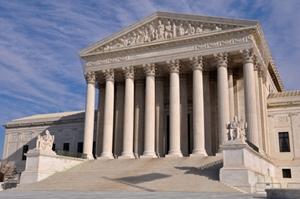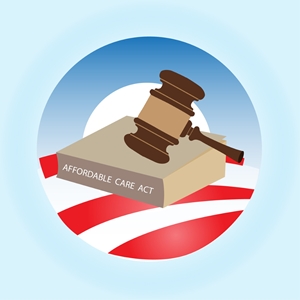
In the latest legal finagling brought against the Affordable Care Act, which requires large businesses to provide employee benefits to their full-time workers, opponents of the legislation charged that it was unconstitutional in nature because of the way in which it went through the halls of Congress. However, the U.S. Supreme Court saw things differently and summarily dismissed the complaint, further suggesting that the ACA is here to stay.
Before health care reform reached President Barack Obama's desk in 2010, having not received a single Republican vote, the bill originated in the Senate, not the House of Representatives as the U.S. Constitution stipulates for all legislation that deals with the raising of revenue. But the high court ultimately decided that since the ACA was passed primarily to improve the state of health care – not raise revenue, as ACA detractors believed it to be – it falls outside the compliance corridor typified in the U.S. Constitution.
Court ruled on ACA in 2012, 2015
This isn't the first time that the ACA's legitimacy has been put in front of the nine justices that make up the Supreme Court. In June 2015, for instance, the justices decided in a 6-3 ruling that tax subsidies were, in fact, legal to include in the health care law, determining that they were a crucial component of the ACA's solvency. Three years before that, the Court ruled 5-4 that the government was within its authority to penalize Americans and business owners for failing to comply with the health law. Speaking on behalf of the majority, Chief Justice John Roberts said that because the bill could be considered a tax – and the legislature has the Constitutional authority to levy taxes – the penalty was permissible.
Business owners can be charged several thousands of dollars for each person not offered coverage, which must meet a specific set of standards laid out by the U.S. Department of Health and Human Services.
From day one, the health care law that's come to be known as "ObamaCare" has divided the nation, with a fairly even amount on each side supporting it and decrying it. In a survey conducted late last year by Gallup, 44 percent of Americans said they approved of the ACA. Meanwhile, 52 percent said they were against it, believing that consumers shouldn't be compelled to buy health insurance. Over the past five years, support and detraction has waxed and waned, with opponents accounting for the majority of sentiment most of the time.
Reasons why ACA lacks strong support
Much of opponents' ire stems from assurances that didn't bear out. For example, the Obama administration stated on a number of occasions that the health care law would lead to thousands of dollars in health insurance premiums savings. To the contrary, most Americans say they are paying more for health insurance today than they were last year. In fact, Gallup found that nearly three-quarters of respondents said their coverage costs have increased by at least a small amount over the last year. Only 4 percent indicated they'd gotten more affordable.
Additionally, Obama stated repeatedly that if Americans wanted to keep their current health insurance plan, they'd be allowed to do so. That, also, turned out not to be the case, as some insurers have opted out of the ACA – or changed networks – prompting some to drop policyholders from their health care rolls. Furthermore, some Americans have had to drop their plans because they did not meet the minimum standards required by the new law.
One promise that has paid dividends is more people have health insurance. Less than 12 percent of Americans were uninsured in 2015, specifically during the fourth quarter, according to survey data compiled by Gallup. That compares to more than 17 percent in the corresponding three-month period back in 2013.





